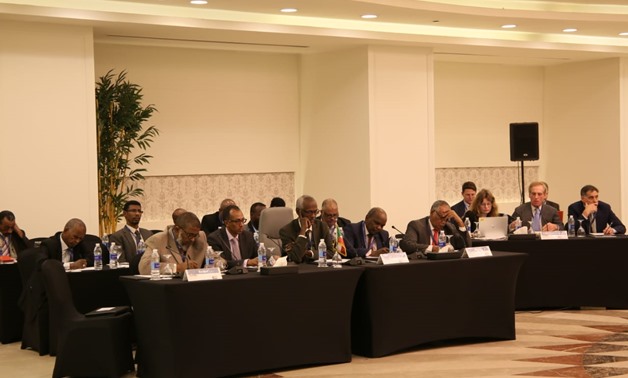
The first round of the second meeting of the water and irrigation ministries of Egypt, Sudan and Ethiopia on the mechanism of operation and filling of the Grand Ethiopian Renaissance Dam (GERD) held on Dec. 2 - Press Photo
CAIRO - 12 February 2020: “The Egyptian government hopes to reach an agreement on the Grand Ethiopian Renaissance Dam (GERD)in the negotiations that will be held in Washington on February 12-13,” said spokesperson for the Ministry of Irrigation Muhamedal-Sebaei on Tuesday.
He added that the meeting will be attended by the Irrigation ministers of Egypt, Sudan and Ethiopia under American auspices, noting that it was agreed to set a timetable to fill the dam, especially in the drought years.
The spokesperson asserted that the three sides are flexible and keen to find solutions to the Renaissance Dam issue.
Sebaie noted that if the three sides reach a final agreement, it will be implemented and signed at the end of February in a major celebration.
After a four-day negotiation in Washington D.C on January 28-31, the three countries reached an agreement on only three points of contention regarding the construction of the controversial dam.
They agreed on a schedule that includes a plan for the stages of filling the dam; they also agreed on mechanisms for dealing with droughts, prolonged droughts, and years of water scarcity during the process of filling the dam, and during the dam operation.
The US drafted a document of agreement regarding the above-mentioned points and was unilaterally signed by Egypt.
The disagreement between the three states dates back to May 2011 when Ethiopia started building the dam; Cairo has voiced its concern that building the dam could harm its 55.5 billion cubic meters share, as 80 percent of Egypt’s share comes from the Blue Nile and Ethiopian Heights.Meanwhile, Ethiopia says the dam is necessary for its development and electricity production.
The three countries reached an initial deal in 2015, announcing the “Declaration of Principle,” per which the dam should not cause any harm to the downstream countries.

Comments
Leave a Comment